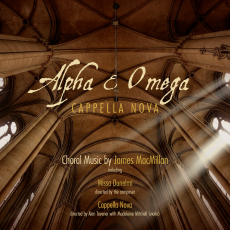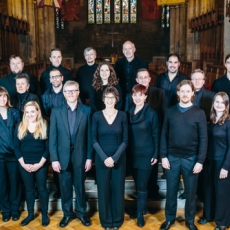Cappella Nova - Alpha & Omega - MusicWeb International
This is the third disc of choral music by James MacMillan that
Alan Taverner and Cappella Nova have made for Linn. The two previous discs,
both of which were excellent, were welcomed on MusicWeb International by Gary
Higginson and by me.
This time around Cappella Nova have achieved something of a coup in that the
composer himself conducts them in Missa Dunelmi, surely a well-deserved
seal of approval for their work on behalf of his music. I expect to make
several references to the notes during this review. They take the form, once
again, of a conversation between James MacMillan and Rebecca Taverner, a
co-founder of Cappella Nova and a soprano with the group. She's evidently
extremely well-versed in MacMillan's music and her questions are uncommonly
well-informed and perceptive.
Though MacMillan undertook doctorate studies, with John Casken, at Durham
University he admits in the aforementioned conversation that during his time
there he wasn't especially active as a choral composer and his connection with the
cathedral was ‘minimal'. The request from the cathedral to write a Mass for
their choir came much later. It's a Missa Brevis, lacking a Credo setting and,
like everything else on the disc apart from Domine
non secundum peccata nostra it's
for a cappella choir. The Mass is modest in scale and
tone - I'm almost tempted to say humble - and the music is largely thoughtful
in tone, even in the Gloria, which might be expected to include extrovert
music. I was struck at the end of that movement by the way in which MacMillan
sets the word ‘Amen'. Here is no confident, still less assertive, signing-off.
Instead the Amen is sung on a diminuendo and the very last time that we hear
the word it's sung quietly and, it seems, from a distance. It's most unusual
and very effective. The Sanctus is prayerful and, at times, almost withdrawn
though the Hosanna is very affirmative, both here and after the Benedictus. The
music of the Agnus Dei is principally chordal. The movement is slow and
meditative and has a grave, subdued beauty. For all its restraint - indeed,
perhaps thanks to that restraint - Missa
Dunelmi makes a strong
impression. This performance, we are told, is the first one that the composer
has conducted and it's a very good one indeed.
A few months ago I reviewed an excellent disc of MacMillan's music
by the Choir of Westminster Cathedral. As I listened further to this new
Cappella Nova disc I became increasingly struck by the contrast between the two
programmes. The Westminster disc, recorded with a larger choir in a huge
acoustic, contained several pieces which I might term ‘public' in tone. By
contrast, the predominant mood of this present programme is more intimate;
though by no means all the music is quiet the prayerful, reflective nature of Missa Dunelmi tends to predominate. I think this
contrast is good for it reveals a different aspect of MacMillan's liturgical
music and a different - and equally valid - way of approaching it. So, devotees
of his music who already have the Westminster disc can and should invest in
this Cappella Nova programme too, their decision helped by the fact that there
is no duplication of music whatsoever.
The four items that follow the Mass are all Marian pieces, an intelligent bit
of programming. I was aghast to read in the notes that MacMillan and his
frequent librettist Michael Symmons Roberts were once accused by a musicologist
of misogyny in their work together. I've heard a lot of MacMillan's works now,
including several in which he collaborated with Symmons Roberts, and an
association with misogyny has never even entered my head. I haven't read the
paper in which that view was put forward so I don't know on what basis the
thesis was advanced but, based on the pieces I've heard it seems a contrary
view to me. I don't think any of the four works recorded here could be cited as
evidence against MacMillan.
Among these Marian pieces...fiat mihi... is a re-working for a cappella choir of a passage from his stunning St John Passion (review).
It's a very beautiful setting which, to my ears, most effectively conveys the
anguish - yet also the dignity - of Mary at the foot of the Cross. This is
another subdued piece: here is no breast-beating; rather, Mary's composure
despite suffering is suggested. It was logical to follow that piece with Cum vidisset Jesus which sets the passage from St John's
Gospel when the dying Christ commits his mother to the care of the disciple,
John. Here too much of the music is subdued and thoughtful in tone though the
words of commendation are more passionate.
Invocation is a
setting of words by the late Pope John Paul II. I was intrigued to read that
this setting originated in a very secular way. Originally MacMillan wrote it
for soprano and small ensemble as a kind of cabaret song and it was first heard
during a political cabaret event, organised by Dominic Muldowney, at the
Almeida Festival. MacMillan says that he ‘didn't let on who the author was and
they thought it was a kind of left wing protest song!' I think the late Pope
might rather have enjoyed that irony, though perhaps it does show how close
Christianity and left wing political ideals can be. To be honest, the cabaret
origins of the piece are hard to imagine when one listens to this beautiful,
dedicated music given a rapt performance by Cappella Nova.
Domine non secundum peccata nostra was
written to mark the 500th anniversary
of St John's College, Cambridge and is dedicated to the college's Director of
Music, Andrew Nethsingha. The piece incorporates an obbligato violin and the
composer admits that the difficulties of balancing the violin against the
singers had rather put him off writing for comparable forces again but that
this performance by Cappella Nova and Madeleine Mitchell has convinced him that
the combination works. It certainly comes across well here; the violin is so
balanced that its sound registers properly with the listener without
dominating. That's clearly a tribute to the skill of the musicians but it must
also reflect well on Producer/Engineer Philip Hobbs who has recorded the whole
programme expertly, producing sound that is atmospheric yet clear.
The conversation in the booklet between the composer and Rebecca Taverner is
required reading. The booklet is beautifully produced with very clear typeface
- would that this was always the case! It's a minor irritant, however, that the
documentation omits the dates of composition of the various pieces, which I
think is rather important information. It only took me a few minutes to find the
information from the website of MacMillan's publisher, Boosey &
Hawkes so why can't these details be provided in the booklet to purchasers of
the disc?
That's a small cavil, however, when everything else about this release is so
good. The music is stimulating and compelling and the performances are first
rate. I should imagine James MacMillan is delighted with the committed advocacy
of his music by Cappella Nova: once again they have done him proud.

